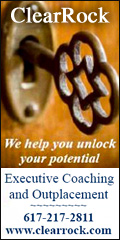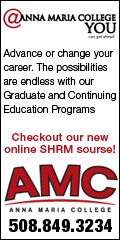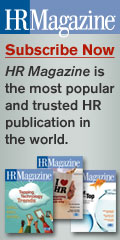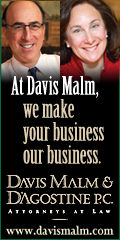
| March 2012 | Past Issues | Advertise |
Have you found 'Success at Work'?
Ed Evarts: When we first met, Beth and I quickly realized that we had a shared passion for the impact that personality preferences can have on the performance of a leader. Our collective work was also focused on the areas of change, conflict, and communication. So, as coaches, the opportunity to positively impact the performance of business professionals in greater numbers than our individual work with clients was too good to pass up. I have strong Human Resources and Leadership Development experience and Beth has an accomplished background in Career Coaching and Leadership Training. We recognized that two facilitators with varying backgrounds and experiences would provide a richer and more engaging experience for our participants. How did you come up with the name? Beth Kennedy: Our experience has been focused on helping individuals in the workplace be successful. It was important to us that the name of the program connected with our participants. We love the name Success at Work as it is a double entendre. The name describes the experience of success working and being successful at your workplace. What does 'success at work' look like for each of you? Beth: Having a background as a Career Coach, for me, success at work begins with an individual finding a position with a good career fit. The next step is the individual taking charge of their career and focusing on competency development and resiliency. As careers become busier than ever, individuals need to have resiliency. A key step in building resiliency is self awareness and this is where the personality preferences become a crucial step for being successful at work. It gives an individual a snap shot understanding of their natural strengths and blind spots and it can be applied to many areas that individuals need to work on in their career including, communication, change, conflict, and innovation. Ed: For participants in our program, success at work starts with a deeper understanding of personality preferences and how individuals at work communicate, manage change, and navigate conflict differently due to their personality. While generic models on communication, change, and conflict are helpful, unless the personalities of the individuals involved are considered, an opportunity is being missed to maximize success. How do you ensure concepts learned "stick" long after the program is over? Beth: As students of facilitation and training, and having attending many training programs ourselves over the years, we find a major challenge for participants is too much theory and too little actionable next steps. Or, where a program is focused on actionable next steps, there are way too many! We like to call it the Dusty Binder Syndrome. Many programs have so much information that the brain cannot absorb it all. Within a week of the training, the binder is likely to be on a bookshelf in a participant’s office, collecting dust. Ed: We also believe that one strategy does not work for all. We decided that our programs would be infused with two key characteristics: self awareness and action. Participants are able to customize strategies that work for their personality preference and the program provides a finite number of actionable strategies that participants can begin using right away. Motivation theory has shown that individuals are more likely to take action on their own ideas versus the ideas of others. By personalizing tactics and strategies, these activities are more likely to stick "long after the program is over." Why do you choose to use the MBTI? Beth: I began using the MBTI in 1991, and I have been trained in numerous other personality and leadership assessments. In my fifteen years of coaching and training, the one assessment on which clients have consistently given positive feedback is the MBTI. The recurring feedback is that the MBTI gives them a tool set to connect better with subordinates, colleagues, and their boss. The assessment also provides participates a greater awareness of areas in which they could improve to make a stronger impact at work. This feedback from diverse clients in different functions and industries has validated the success of the tool. Ed: I came to the MBTI later than Beth. When I searched the market for a personality preference assessment tool to help my clients increase their effectiveness, there was no contest. The MBTI is the most validated and reliable personality assessment tool in the market. The depth of insight and the instant self awareness on clients' faces as they review their feedback for the first time is enough proof for me that this is a valuable tool. In what ways did you consider adult learning styles in developing these courses? Ed: We have purposely designed Success at Work to connect with the varying adult learning styles (visual, auditory, and kinesthetic) of our participants. Our visual learners will find engaging workbook materials, concise and colorful power point slides and clear case-study examples to help them visualize a situation. Our auditory learners will benefit from two experienced trainers who possess varying styles and the opportunity to actively participate in triad (three-person) discussions and debriefs with classmates. Our kinesthetic learners will have time during class to practice what they are learning and obtain instant feedback from other participants. Why is Navigating Conflict your most popular course? Beth: At the center of most conflict is an unmet need at the individual, team, or organization level. When you navigate conflict successfully, you increase trust, catalyze change, strengthen morale, promote innovation, and expedite decision-making. To harness the positive effects of conflict and to avoid conflict disasters, people need to be skilled at uncovering unmet needs through more effective conversations. Your programs are approved are HRCI certified, and they are also approved for continuing education credits for PMI—where do you see the overlap between project management and human resources? Ed: We love the relationship that exists between human resources and project management. Most of our human resource participants would acknowledge they can increase their effectiveness through enhanced project management skills. Most of our project management participants would acknowledge they can increase their effectiveness through enhance human resource skills. By welcoming participants from these two areas, our learners have a richer experience. We are not trailblazers in this area however as NEHRA has a very popular program for its members called Project Management Skills for Human Resource Managers. We have seen in our program that both of these vocations can learn a lot from each other. Why partner with NEHRA? Beth: When we were strategizing on ways to bring Success at Work to the marketplace, we wanted to partner with an organization that had a strong footprint in the New England marketplace and creates a strong sense of community for its members. With our human resources and training background, NEHRA was the perfect fit. There are a lot of other programs out there on conflict, communication, and change. What differentiates S@W? Ed: We think that since there are other programs focused on these key areas, these topics are important in the market and they resonate deeply with business professionals. Our programs are different, however. We focus on the intersection of personality preferences and change, conflict, and communication. This is not a "one-size-fits-all" experience for our participants. Participants leave our program with insight into their personality, a unique communication, change, and conflict profile, a professional development certificate, and strategies for making an immediate impact once they return to their workplace. Tell me more about the Professional Development Certificate. Beth: In partnership with NEHRA, participants who complete all three Success at Work programs receive a Professional Development Certificate. Due to the recurring focus on personality preferences and the application of this information on change, conflict, and communication, participants build a new skill set allowing them to positively impact their effectiveness at work and their workplace in general. We thought participants who impact their workplace in a positive manner deserve to be recognized and a certificate seemed a perfect way to do that. What makes the Success at Work learning experience different for participants? Beth: In the feedback we hear from our participants, the differentiators include the variability of our delivery techniques, the triads where participants repeatedly work in small groups, the intersection between personality preferences and our topics, and the highly interactive experience which we actively cultivate. We don’t do a lot of "telling." We recognize there is a wealth of experience and insights already existing within our participants and we work to ensure this information is integrated into the program. Could you share any feedback from your recent programs at NEHRA? Ed: We’d love to. Many of our participants experience "aha moments" that help them be more successful at work. Here are just a few examples:
For more information about Success at Work, and the certificate program please visit nehra.com
|
|
303 Wyman Street, Suite 285, Waltham, MA 02451-1253 |
 |



